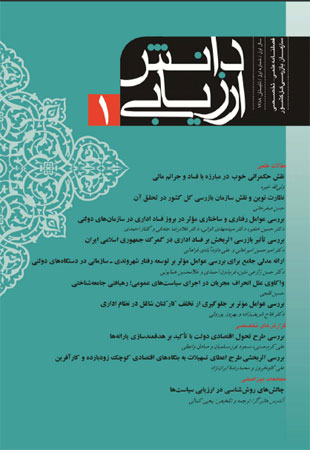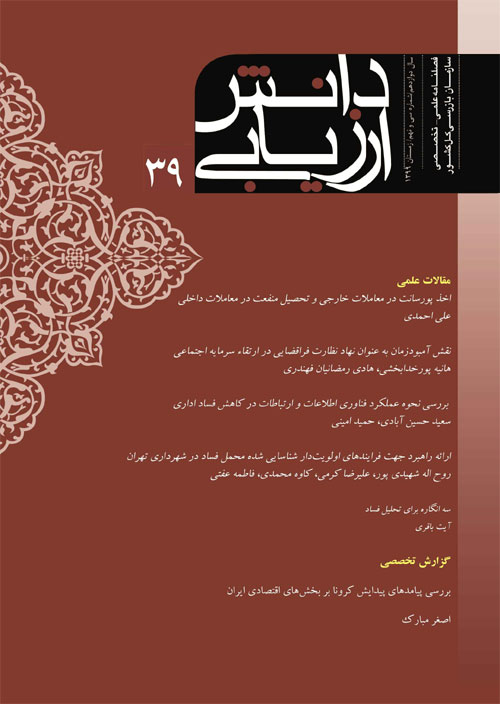فهرست مطالب

فصلنامه دانش ارزیابی
پیاپی 1 (تابستان 1388)
- 328 صفحه، بهای روی جلد: 15,000ريال
- تاریخ انتشار: 1388/10/20
- تعداد عناوین: 12
-
صفحه 5
- مقالات علمی
- گزارش های تخصصی
- مطالعات بین المللی
- اخبار پزوهشی
-
صفحه 315
-
Page 19Good governance is a new model for sustainable development. In this model there is an emphasis on cooperation based on participation and the interaction among government, private sector and the civil society so that countries can utilize all their capabilities for an all-out development. Apart from expressing definitions and concepts on good governance offered by valid international organizations and institutions, this paper articulates the relationship between governance and corruption in domestic and international arenas. moreover, this paper makes mention of the capacities and adopted measures by the Islamic Republic of Iran in order to establish good governance and combat money laundering and other financial crimes.Keywords: Good Governance, Financial Crimes, Corruption, Accountability, Voice, Rule of Law, Control of Corruption, Public Management, Deregulation, Money Laundering
-
Page 53One of the most important elements of the modern management in all systems is the supervision. This element is so important because it ensures the right direction of all factors towards the desired targets. Organizational activities shall be implemented within the framework of the targets, the policies as well as the relevant plans and managers, as one of their important responsibilities, shall be seeking for the regulated and effective methods for establishment of the network for receiving required information on the function of the system and its compliance with the relevant targets, plans and policies. The better function of the system will be ensured for obtaining the desired targets; Given the fundamental developments in different economic, social and cultural areas we need a change in our approach from the traditional one to modern one for the establishment of an efficient supervisory system. This new and modern atmosphere in the supervisory area may be realized through science oriented and professional supervisory methods using the unofficial and popular capacities, the media and electronic monitoring facilities. The general inspection organization as the main supervisory arm in the country has already taken important steps towards establishment of the modern supervision with a reformist, comprehensive and far-reaching look emphasizing suitable implementation of the relevant rules and regulations: this is what the present paper brings into its consideration.Keywords: Supervision, Modern Supervision, Popular Institutes, Media, the Press, Electronic Monitoring Facilities
-
Page 73Purpose of the present study is to identify the reasons and factors behind the administrative corruption in the government organizations located in the Tehran province. "Study of the Behavioral and Structural Factors Which Cause the Administrative Corruption in the Government Organizations and Departments" is selected as the title of the paper. This study has covered staff of the Ministry of Housing who has been in charge of implementation of construction projects in government and public sectors at the time when the present study was carried out. In our study we have used a questionnaire titled "The Investigation Form" which has already been confirmed by the relevant experts. A pre-exam was carried out by distribution of 30 questionnaires among the staff and the result number was extracted based on the Koronbakh Alfa index equaling to 0. 86. The pre-exam was held for 200 individuals 45 of which were used for statistical purposes. The Number of the questionnaires filled and collected was 66. In the study 5 factors as the behavioral factor and 4 factors as structural ones were introduced as the factor which influences the administrative corruption. The outcome of the preexam and the statistical analysis implies a meaningful relationship among the mentioned factors.Keywords: Corruption, Administrative Corruption, Behavioral Factors, Structural Factors
-
Page 101Based on the Transparency International (TI)'s 2008 report on the administration corruption in the world out of 180 countries studied by this body Iran, with the score of 2.3, stands 141st. For this study the worst and the best scores fluctuates between respectively 1 and 10; score 1 for the most corrupted administrative system and 10 for the least corrupted administrative system. According to the same report, as compared with the year of 2007 in which Iran stood 131th out of 179 states, with the score of 2.5 Iran's standing has demoted remarkably in the current year. One of the most significant threats exposed to the administrative system is the administrative corruption. Until now different definitions have been introduced for the administrative corruption each one, as its part, has been effective in shedding more light on this heinous phenomenon. But the administrative corruption, at first has been of an ethical and value connotation which gradually lost its ethical aspect having come out as a concept with a certain definition used in the public management and political sciences fields. The administrative corruption which is the opposite of the health in the administrative system, based on the TI definition, implies misuse of the public power for the private administrative benefits for the purpose of personal or family interests. In the present study we bring three factors or organizational categories to our attention namely supervision and control, salary and wages as well as process of activities of the customs trying to examine their impact on the occurrence of the administrative corruption.Keywords: Corruption, Islamic Republic's Customs Organization, Control, Supervision, Transparency
-
Page 125The present paper intends to introduce a comprehensive model to examine the factors which influence the development of civil organizational behavior in the government and pubic institutions as a self- control and self-supervision means. The Outcome of our study suggests that the structural, leading, personality, cultural and value factors are among those factors which influence the development of civil organizational behavior.Based on the findings, the more organic the organizational structure, the more organizational behavior will be realized. Also, if the leadership of the managers and directors is of more dynamic nature, the more civil organizational behavior can be witnessed. On the personality factors, the outcome of our research indicates that the specifications of the right side of the big five personality factors affect the civil organizational behavior more than any other specifications. On the role of the cultural factors the outcome confirms this reality that right side of the Hafstad six fold spectrum organizational culture plays very important role in the development of civil organizational behavior. According to the research and investigations made on the value factors are indicate that the social capital and organizational justice are considered as two important and key factors in emergence of civil organizational behavior.Keywords: Civil Organizational Behavior, Structural Factors, Leadership Factors, Cultural Factors, Personality Factors, Value Factors
-
Page 151Social, economic and political situation is considered as the main factor in successful implementation of every general policy. The bureaucratic social environment which is responsible to implement the desired policies is the first issue that a policy maker shall bring into his/her consideration in adopting any policy and also in designing the relevant organizational structure. It is notified that the specifications and interaction of executive and administrative personnel who are abided by their own values and desires are of paramount importance as well. This factor is influenced by a number of other factors and automatically and directly it influences the implementation process accordingly. In another word this factor is considered as the circle which links other circles in the implementation process. In the present paper we intend to analyze the bureaucratic environment in our country given the ecological theory of bureaucracy and sociology of organizations and secondly we will review the roles and status of bureaucrats in implementation a general policy like privatization process using the theory of the general selection. In conclusion we will introduce the models which are used for designing mechanisms to control deviation of administrative and executive personnel.Keywords: Evaluation, Implementation, Policy Making, Monitoring, Bureaucracy, Administrative Corruption
-
Reviewing of Effective Factors in Preventing Public Servants from Violating the Laws and RegulationsPage 181Corruption or fraud or administrative violation is a phenomenon considered to be one of the obstacles in the way to development in today’s world and in particular in developing countries and could bring detrimental damages to the smooth movement of the wheels of development in society. There are many factors involved in the formation of corruption in a way that it possesses a multifaceted nature. Consequently several plans developed by government have been futile. Experiences gained from the execution of such plans indicate that in order to reduce or remove this evil, we require plans for the purpose of analyzing the issues and while evaluating various approaches select the efficient strategy and then execute it. The objective of this research is to review the effective factors in preventing public servants from violating the laws. The mentioned factors have been considered by applying fifteen assumptions including the relevancy of career with character, transparency, evaluating performance, training and capacity building, discipline, remuneration, relevant integration of individual’s goals and those of organization, external pressures, public participation, freedom of press, process of socialization, ethics in organization, power and responsibility, safety and mental health in workplace and involving staff in the process of decision making.Keywords: Administrative Corruption, Transparency, Quality of Life Labor, Capacity Building, Integration of Goals, Confidence


